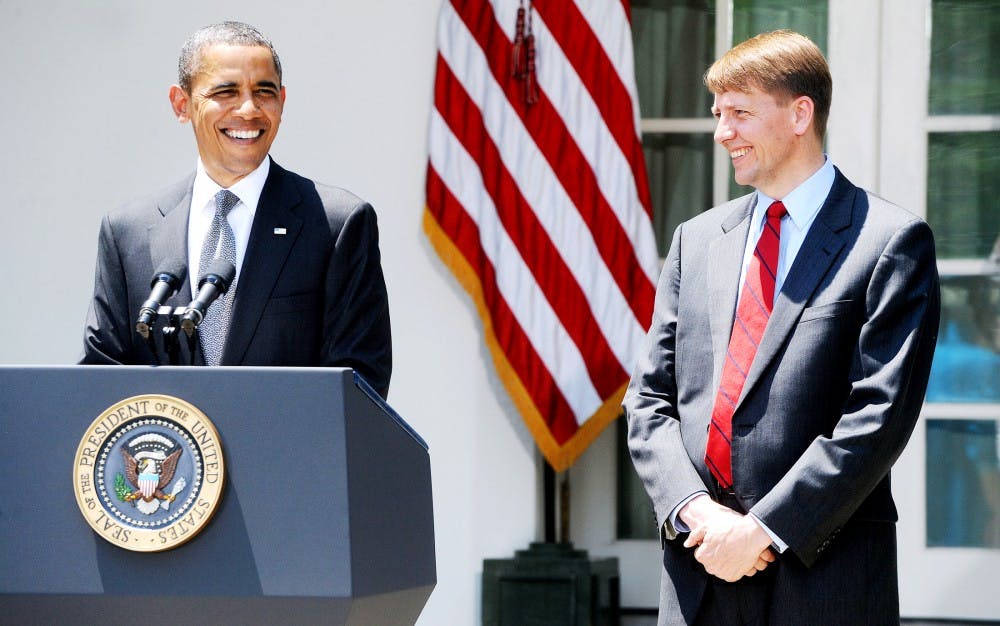Long before Richard Cordray began working with President Barack Obama, he escaped from everything deep in the bowels of South Neighborhood dorms.
He’d descend to the basement floors of Case, Wonders or Wilson halls — where nobody could disturb him — to knock out long essays as a student in James Madison College all night, not emerging until the sun rose.
“There were times when i would pretty much stay up all night then go to bed the next day,” Cordray said.
Cordray, now director of the fledgling Consumer Financial Protection Bureau, has been a rising star and a subject of intense controversy in Washington, D.C., since Obama flexed his executive power to appoint him in January. The bureau, which began in July 2011, was formed as a result of the 2008 financial crisis to protect fairness and transparency in consumer credit and purchasing.
Senate Republicans tried to block Cordray’s appointment and argued the new bureau has the potential to wreak havoc on the U.S. business sector by granting unlimited power to an organization that could instate an onslaught of job-killing regulations. Obama, who has argued the new bureau is necessary to protect everyday citizens, instated Cordray on a recess appointment — which allows the president to unilaterally appoint a nominee if the Senate is in recess.
“I can’t imagine how anybody could maintain, under the circumstances, that your appointment and your service is valid,” Sen. Mike Johanns, R-Neb., said to Cordray during a Senate committee meeting Tuesday. “And I can’t imagine … how the actions you’re taking will be upheld.”
Cordray said in a State News interview he’s not worried the controversy will affect his job and is focusing on the work ahead of him.
But the fact that one party doesn’t think his bureau should exist almost definitely will present a problem for Cordray, MSU political science professor Matt Grossmann said.
Cordray and the bureau also have been working an a database for college affordability, which would be a dashboard for colleges including projected cost, loan options and information on repayment after graduation. Obama lauded Cordray’s work in both his State of the Union Address and when he spoke at the University of Michigan last Friday.
Old stomping grounds
Thirty years before any of that, Cordray was a freshman in a Case Hall dorm room. Cordray came to MSU with a full ride scholarship and left with a 3.99 grade point average.
He later would go on to Oxford University and University of Chicago Law School, followed by a career as a Supreme Court clerk and the attorney general of Ohio.
An out-of-stater from Ohio, Cordray first looked into MSU because his mother is an alumna, he said. Growing up a Buckeye fan, Cordray said he didn’t come just to be a Spartan — he was drawn to James Madison specifically because of the idea of attending a small college within a large university.
“That was the final nail in the coffin,” Cordray said.
Cordray helped save James Madison College from the chopping block with a speech he gave in 1981, James Madison professor Kenneth Waltzer. Budget cuts threatened to eliminate several academic programs, including James Madison.
“He’s sort of the leading face in the student heros of that situation,” James Madison Dean Sherman Garnett said.
Although he never had Cordray as a student, Waltzer still remembers his speech.
“Cordray was a natural leader,” Waltzer said — a centrist liberal during Ronald Reagan’s height.
One of the biggest influences during his MSU years, though, was the rigorous writing assignments, Cordray said, which taught him skills he used throughout his career. But like many college students, Cordray often stayed up all night to finish class assignments, although he almost always pulled away with perfect grades, said Steven Kautz, an MSU political science professor who was one of Cordray’s close friends during college.
“He would have a habit of writing his papers at the last minute and staying late up into the night to finish them,” Kautz said.
During his college years, Cordray wasn’t all business. Kautz recalls him having a large group of friends — a real people person — and being active in intramural sports. On some weeknights the two would go to the Peanut Barrel, 521 E. Grand River Ave., for trivia night, where they would answer questions to earn discounted drink tokens.
Those trips to the bar paid off: Cordray later went on to win more than $40,000 as a five-time Jeopardy champion.
Support student media!
Please consider donating to The State News and help fund the future of journalism.
“I actually made more money on Jeopardy than working for the federal government that entire year,” Cordray said.
Discussion
Share and discuss “Alumnus works to protect consumer finances in D.C.” on social media.







